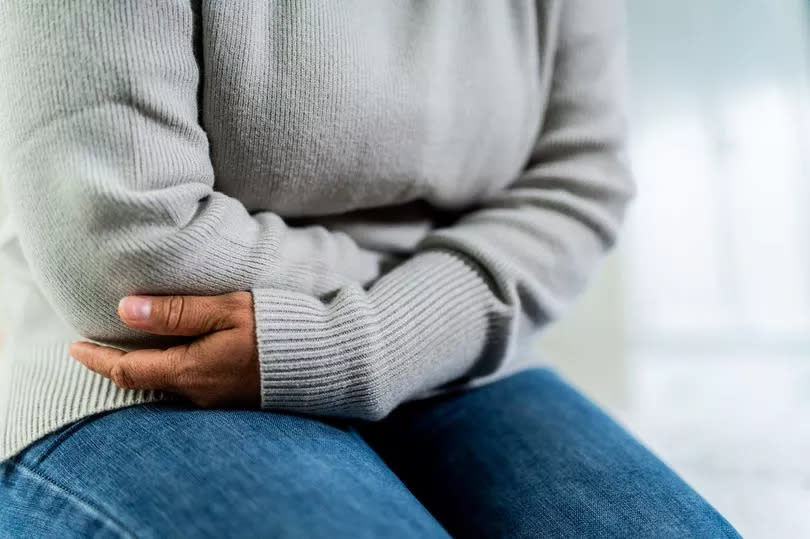NHS warns 'see GP' about common condition if you've been feeling bloated for 'weeks'

The NHS is urging people to see their GP if they have been bloated for a certain number of weeks. The health service says that people who have been feeling bloated for a while to visit their doctor and state that about three weeks could signal an issue. Specifically, it could mean you have Adenomyosis.
Adenomyosis is a common condition where the lining of the womb (uterus) starts growing into the muscle in the wall of the womb. There is no cure however there are treatments that can help with any symptoms.
What are the symptoms of adenomyosis?
There are a number of symptoms you need to be aware of. However whilst some may have some - or all - of the symptoms, others have none at all.
Some symptoms of adenomyosis affect your periods, such as:
painful periods
heavy bleeding during your period
Other symptoms can happen any time in your menstrual cycle, such as:
pelvic pain (pain in the lower part of your tummy)
bloating, heaviness or fullness in your tummy (abdomen)
pain during sex
Although they sound the same, people should be aware that adenomyosis is different from endometriosis. The latter of the symptoms - which is also common - is where tissue similar to the lining of the womb grows in other places, such as the ovaries or fallopian tubes. You can read all about endometriosis here.
When should I see a GP?
The NHS say you should see a GP if:
your periods become more painful, heavier or irregular
you have pain during sex
heavy periods are affecting your life or you've had them for some time
you've been feeling bloated for a while (about 3 weeks)
you bleed between periods or after sex
What will happen at my GP appointment?
If you exhibit symptoms of adenomyosis, your GP may ask about your menstrual cycle and examine your abdomen to check for any swelling or tenderness. You have the option to request a female doctor at the time of scheduling your appointment.
Additionally, the doctor may do an internal examination to assess your vagina and cervix, which is the passage from the vagina to the uterus. During the examination, you're entitled to have a companion, family member, or a staff member present if you choose.
In some cases, further diagnostic tests may be necessary to determine the cause of your symptoms or to exclude conditions with similar presentations, such as endometriosis. Tests may include either an ultrasound scan or MRI scan.
Should I call 999?
You should ask for an urgent GP appointment or get help from NHS 111 if your pelvic pain or period pain is severe or worse than usual, and painkillers have not helped.
What are the treatments for adenomyosis?
If you’re diagnosed with adenomyosis, there are treatments that can help ease your symptoms. Treatments include:
the IUS (intrauterine system, also called Mirena or hormonal coil), which thins the womb lining, making your periods lighter and less painful
other types of hormonal contraception if you cannot or do not want to have an IUS, such as the progestogen-only pill, the combined pill or the contraceptive patch
medicines such as tranexamic acid or NSAIDs
If these treatments do not work, you may need surgery. This could be a hysterectomy, or surgery to remove the lining of your womb (endometrial ablation).
How can I ease my symptoms of adenomyosis?
There are a number of things you can do to help with period pain or pelvic pain caused by adenomyosis. This includes:
use a heat pad or hot water bottle wrapped in a tea towel on your tummy
try a TENS machine – a small device that uses mild electrical impulses to reduce pain
take painkillers like paracetamol or ibuprofen

 Yahoo News
Yahoo News 
